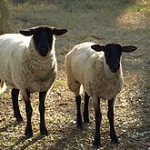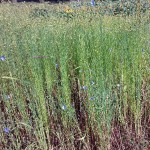by Catherine Haug
Updated 3/26/10 to add Flip Video still shots
This event was presented by the Alpine Spinning and Weaving Guild.
The following is a short outline of the event. For the complete gathering summary, including photos and links to websites offering online educational videos for many steps in the process, see our pdf file:
Gathering Summary: Making Cloth
Also, be sure to read the comments at the bottom of the post, for more information.
 Presentation Outline
Presentation Outline
Working with Wool
(Photo of Suffolk Sheep from Wikipedia)
Judie Overbeek opened the presentation with an overview of the process and introduction of the other presenters:
- Clean the wool (demonstrated by Mary Warner);
- Process the wool by combing or carding (combs, cards and drum carder demonstrated by Julie Valentine);
- Spin the wool (drop spindle and spinning wheel demonstrated by Irma Jean Hannon and Irene Houston);
- Ply the wool (if desired);
- Weave the wool, or use other methods such as knitting and crocheting (weaving demonstrated by Glenda Smith and Judie Overbeek);
- At any point in the process, the wool can be dyed. But if you want to blend colors, you must dye before spinning or plying.
 Working with Flax
Working with Flax
(Photo of Flax Field in Bloom from Wikipedia)
Sylvia Callentine then gave an overview of flax for linen, from sowing the seeds through spinning the fibers.
Open Floor
The presentation was then opened for attendees to meet the presenters at each of their stations, to get more detail and hands-on experience.
Closing Presentation
We closed the event with a presentation by Judie on different kinds of looms, and about the guild.
Flip videos
Flip video still-shots from the event, by Sally Janover:
- Drum carder
- Warping a table loom – 1
- Warping a table loom – 2
- Shed and Shuttle: weaving on table loom
- Spinning with spinning wheel
- “Critter to Sweater”, an illustrative book
- Flax fiber, yarn and knitting project
- Knitted items, from hand-spun yarns
Files and Resources
For the complete gathering summary, including photos and links to websites offering online educational videos for many steps in the process, see our pdf file:
- Gathering Summary: Making Cloth
- Joy of Hand Spinning
- All Fiber Arts: Processing Flax into Yarn
- Chest of Books: The Story of How Linen is Grown
- Going to the Sun Fiber Mill (Kalispell)
Magazines:
from Kevynne Layne (kevynne.blogspot.com/)
This looks really great, Cat. The only thing I would add has to do with washing wool fleece.
If you have a septic tank, it’s not advisable to use your washer, as the grease and lanolin will play terrible havoc with the septic tank.
We have one and I do not use my washer. I use a 5 gal bucket with the hottest water I can with Dawn and about a pound of wool at a time. I let it sit for 45 minutes, then rinse in water the same temp as the hot water has become so as to not shock the wool. Then I put it back in super hot water again with more Dawn and repeat for another 45 minutes.
— Sometimes a fleece has been skirted correctly and so the fleece isn’t as dirty so once or twice washing is good.
— Sometimes if the fleece hasn’t been skirted correctly or the owners just haven’t kept their sheep clean it can take 3 or 4 washings to really get it clean
— Some fleeces like Romney, which happens to be my favorite wool for tapestry weaving is very full of lanolin and takes 3 washings usually. But again, don’t use a washer if you are on a septic system.